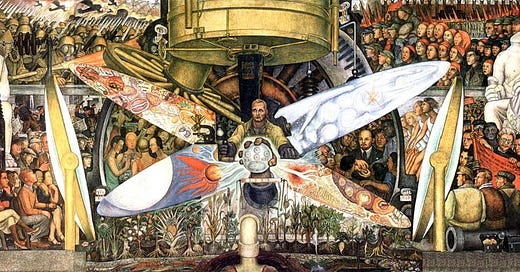AI Will Change The World
Everything you have experienced to date in your life will pale in comparison
Figure 1: Man Controller of the Universe, Diego Rivera (1933)
The transformative power of artificial intelligence (AI) is unprecedented, and its impact on our lives will eclipse previous technological advancements. All the important events in recent human history including the invention of the internet, 9/11, landing on the moon, and WW2 will all be footnotes to the development of AI in some future history of humanity.
Technology moves history
The development of technology, not militaries or politics, propels history. The invention of fire, the printing press, the telegraph, and the internet are all inflection points in the history of human civilization. So too will be the development of AI.
Speed of development
All of this is happening at breakneck, compounding, speed. ChatGPT, a natural language AI, was released to the public in late-November 2022. It quickly became the fastest growing app of all time[i], reaching 100 million users in 60 days. It sparked an arms race in the tech industry, and advances are being made in days and weeks. In contrast, the rubber pencil eraser was invented in 1752 and it took 100 years for it to be affixed to the end of pencils. This rapid progress, combined with AI's capacity to revolutionize industries like healthcare, agriculture, and finance, brings both significant benefits and challenges.
Positive implications
AI will transform every industry, unlock new technological breakthroughs, and enable humans to be much more productive. Ad Astra already has personal experience with friends who are doctors responsibly using ChatGPT to help treat patients. And that’s using a general, public AI (albeit one that can already pass the medical licensing exam and legal bar[ii]). Imagine what will be done with specialized medical, legal, and engineering AIs - among others. AI is going to unleash a period of advancement that exceeds the Renaissance.
Negative implications
AI will also introduce grave new dangers, on a scale exceeding atomic weapondry. Already, an open-source program called Chaos-GPT has been developed, described as "empowering GPT with Internet and Memory to Destroy Humanity."
Chaos-GPT decided that the best option to achieve its evil objectives was to reach power and influence through Twitter…This was a week ago. Since then, it has been interacting with fans like a charismatic leader and has amassed nearly 6,000 followers.[iii]
AI could plausibly iteratively phish for powerful people’s login credentials, hack into and crash an airliner, or a perpetrate a million other evil deeds. The capacity for destruction is essentially infinite.
Post-AI world
To stop all of this, roving “good” AIs are likely the answer. There will be law enforcement AI to combat all the AI thieves, fraudsters, and terrorists. There will also be Democrat and Republican AI in politics, state-level AI in diplomacy, and military AI in war. AI is going to fundamentally transform the world.
Regulation
80 years ago, hundreds of scientists at the Manhattan Project begged President Truman not to bomb Japan with nuclear weapons[iv]. Likewise, today there is a letter signed by hundreds of prominent technologists, including Elon Musk, stating that we should put a temporary moratorium on AI development. Outside of this letter, there are a spectrum of voices calling for regulatory models ranging from light-touch, libertarian supervision, to an FDA-like regulator, to bombing the AI data centers.
Stopping, or slowing, AI progress is impossible. It is inevitable. If the US were to ban AI research, it would move to some other unregulated province in the world, and America would be disrupted. Likewise, slowing AI progress to regulate it is a red herring argument. We don’t know how to regulate AI yet. For better or worse, we’re on a bullet train to somewhere.
Recommended action
To address this unprecedented issue, the US federal government should create a new cabinet-level department, the Department of Digital Governance and AI (DGAI), reporting to the President.
This issue is too important to be a subordinate organization to the Department of Commerce, DoD, or others like the Food and Drug Administration (FDA). AI needs a cabinet-level Secretary devoted to this issue. Other, existing technology-focused regulatory organizations should be rolled under this department. The DGAI will have strong interactions with the Departments of State, Defense, Commerce, Congress, and others. Their first deliverable, due in three months, should be a preliminary plan on how to regulate AI. The private sector and academia should also contribute in an advisory capacity.
Critics may argue that government intervention could stifle innovation or struggle to keep up with rapidly evolving technology. However, given the potential consequences of unregulated AI, the creation of a dedicated department will ensure a balanced approach to AI governance.
This is the most pressing issue facing the American economy, defense, and social fabric today. We need to focus on it.
[i] https://www.zdnet.com/article/chatgpt-just-became-the-fastest-growing-app-of-all-time/
[ii] https://www.businessinsider.com/list-here-are-the-exams-chatgpt-has-passed-so-far-2023-1#us-medical-licensing-exam-11
[iii] https://decrypt.co/126122/meet-chaos-gpt-ai-tool-destroy-humanity





